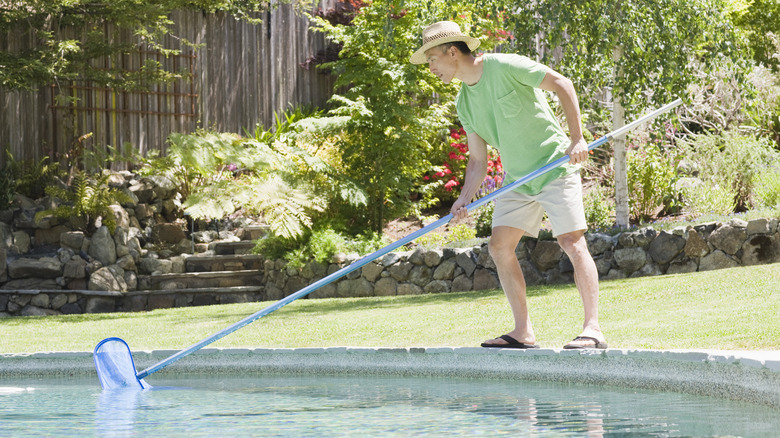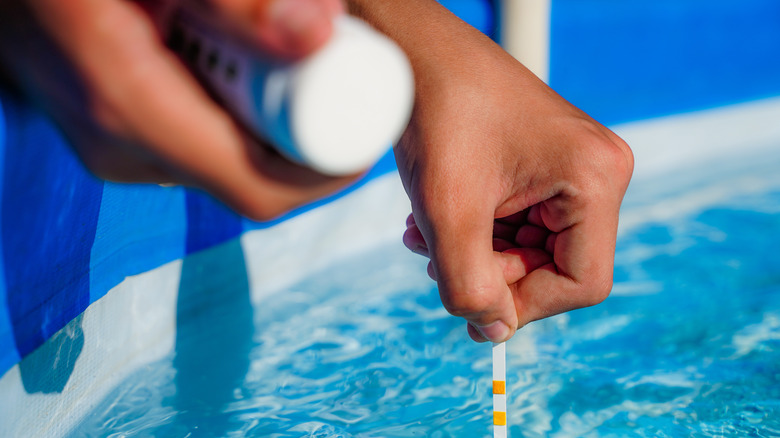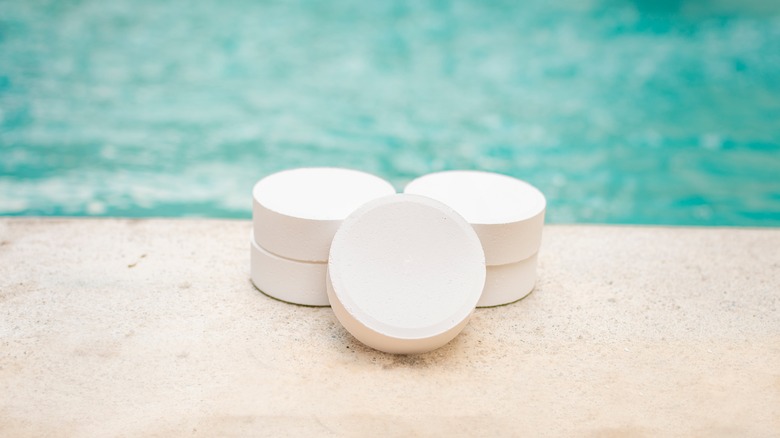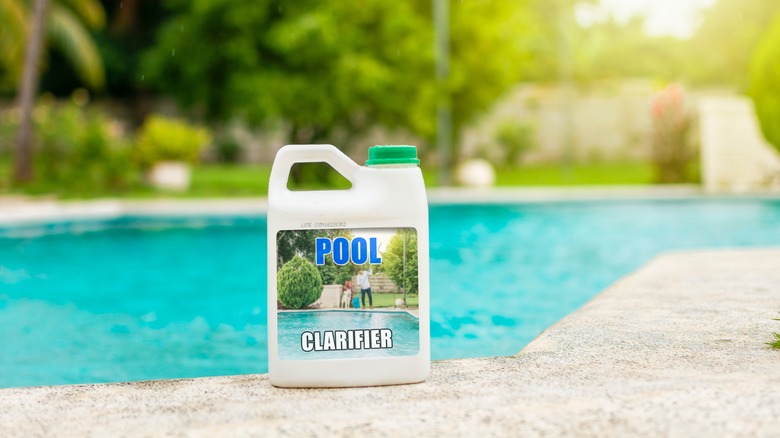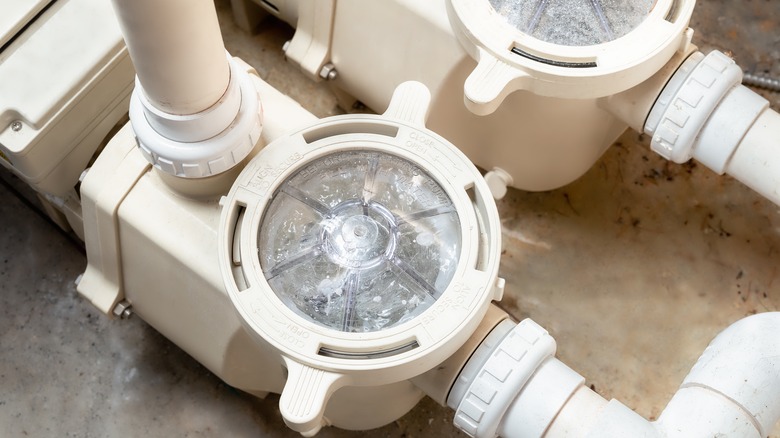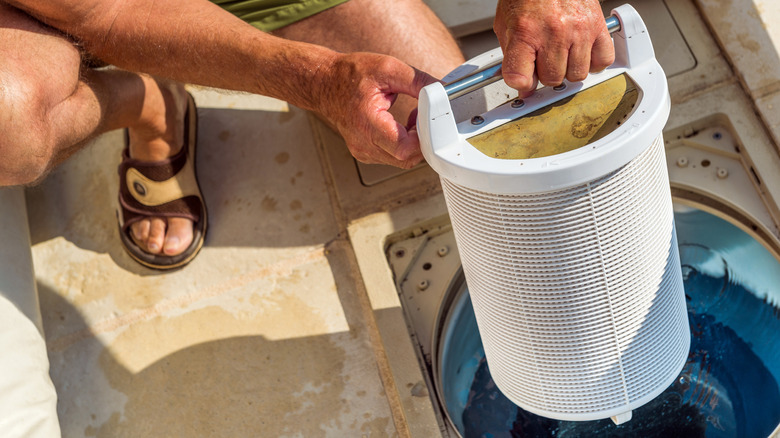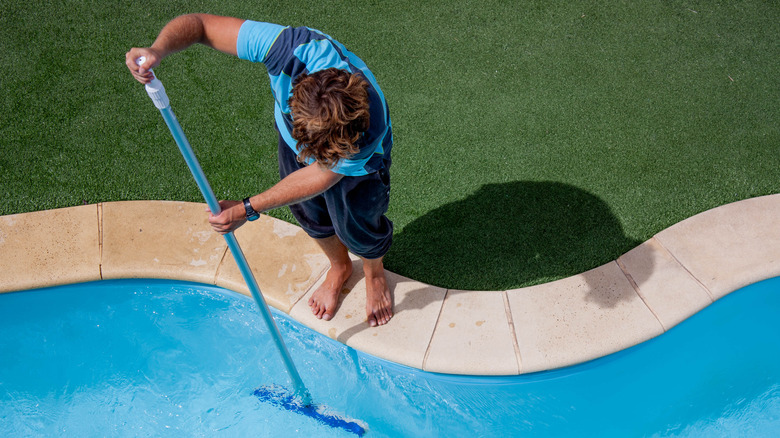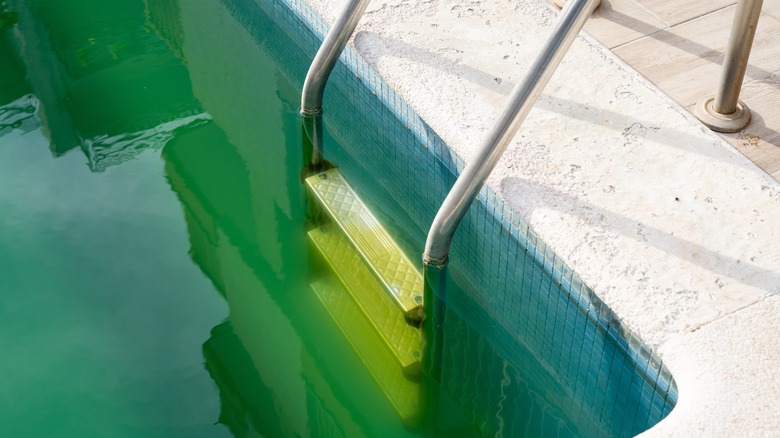The Worst Mistakes You Can Make When Cleaning Your Pool For Summer
For many people, summertime goes hand-in-hand with pool time, especially if you have a backyard pool. But before you allow your kids to go swimming or start holding pool parties, it's important to ensure your pool is clean.
The process goes beyond removing leaves and making sure the water is sparkling blue, however. Cleaning a pool involves daily care, as well as steps you need to take regularly to ensure the water is safe and free of germs. Not only does having a clean pool provide a safe and healthy environment for your friends and loved ones to swim, but it also helps preserve the longevity of your in-ground pool so you can continue to enjoy it for several summer seasons to come. When you don't clean your pool, you may end up spending most of the summer and beyond trying to fix the water, surfaces, and hardware. You'll also want to consider some of the most common mistakes pool owners make when cleaning their pools.
Failing to test the chemicals in your pool's water
Your pool may look clean, but it's important not to judge chemical levels by appearance alone. Even worse, you shouldn't guess when it comes to the amount of chemicals to add to the water. When pool water isn't at the right balance of acidity (pH) and alkalinity, problems can quickly develop, leading to health hazards and damage to your pool.
You can solve this problem by testing pool waster on a regular basis. At minimum, pool water should be tested once a week to make sure it has the correct balance of chemicals. Consider adding this to your calendar, whether you're using a home testing kit, or are taking a sample of water to a local pool supply store for professional testing. The Centers for Disease Control and Prevention recommends that pH levels stay between 7.2 to 7.8. They also recommend testing your pool at least twice a day, especially during times of heavy use.
Adding shock directly to your water or through the pool skimmer
Sometimes, when you need to balance out the pH levels in your pool rather quickly, you need to add shock treatments. To "shock" your pool means you're adding chemicals to help balance out chlorine levels in the water in a rapid manner (hyperchlorination). According to Home Depot, you may need to shock your pool if free chlorine levels reach zero, combined chlorine measures at 0.5 ppm or higher, or if you see signs of algae growth. Aside from knowing whether you need to use shock, you also need to know how to use this properly. This includes not adding shock through the skimmer or directly to pool water because the chemicals won't mix properly and can actually damage your pool.
Instead, it's important to mix the shock treatment with water, per the instructions on the product package (the process may vary between shock tablets and liquid shock). Wear gloves before handling the mixture, and then add it to the water with the pool pump running for at least six hours. Until free chlorine levels measure between 1 and 3 ppm after treatment, you won't be able to swim in the pool. Also, avoid adding shock in the middle of the day, as peak sunlight can decrease chlorine content. To keep your pool clean, Lowe's recommends shocking your pool at least once a week, or more frequently depending on rain, debris, and how often the pool has been used.
Mishandling chemicals for your pool
Whether you have a chlorine or saltwater pool, both types require certain chemicals to help maintain the right pH balance in the water. This means that you're likely to have chemicals for your pool on hand, whether you store them in a shed, garage, or other space around your home. Having chemicals for your pool at home also means there are important safety hazards to you ought to be aware of, particularly while handling them. In fact, the Centers for Disease Control and Prevention estimates that 4,500 people go to the emergency room every year due to injuries related to pool chemicals. Examples of dangers associated with mishandling pool chemicals include injuries to your eyes, lungs, and skin, as well as fires. These can occur from mixing or wetting pool chemicals, spills, or not washing your hands after handling them, or from improper storage.
You can still store and use pool chemicals at your residence while still protecting yourself and your loved ones. First, it's important to always add chemicals directly to pool water, and not in reverse. Wear gloves, goggles, and masks. Wash your hands immediately afterward, particularly before eating or drinking. Use dry, separate tools for each chemical, and store them in their original containers only with lids tightly sealed. Never mix chemicals together, and be sure that you dispose of them through a hazardous waste facility when needed.
Not running your pool pump daily
While you may understandably be focused on the appearance of your pool's water and whether it needs chemicals, it's a mistake to neglect the importance of your pool pump. In fact, this is one of the foundations of any pool. The pump is responsible for circulating water in your pool, while also pushing debris through skimmers so that leaves, dirt, and other debris don't get stuck in the filtration system. It may be tempting to cut down on electricity costs and not run your pool pump as often, but failing to run a pool pump regularly can end up causing more costly clean-ups in terms of water, debris, and hardware failures.
As a rule of thumb, your pool pump should run daily. You can also set a timer to ensure that this happens every single day. The standard recommendation is up to 12 hours per day to allow water to run through your pool's filtration system so that your pool stays clean. You should also run the pool pump whenever you're adding chemicals to the water to ensure proper dispersal. The overall goal is to make sure all of the water in your pool gets filtered once a day, so the larger the pool, the longer the pump needs to run. Smaller pools may require the pump to run eight hours a day, according to Sun Valley Pool Service.
Not cleaning your pool filters
Running the pool pump every day ensures that the water is filtered, but it's equally important to make sure that your filters are in good condition. According to GPS Pools, most pool filters have two-year lifespans, but the timeline can be much shorter if you don't regularly clean them. Without regular maintenance, dirt, debris, and sunscreen can accumulate in your filters, which can then decrease their effectiveness and even damage them. Bacteria can build up in your pool, posing health risks to your family and friends at the peak summer pool season.
The best way to make sure your filters run effectively is to clean them regularly. This also extends the lifespan of the filter, thereby saving you more money in the long-run. The recommendations depend based on filter type: cartridge, sand, and DE filters. Cartridge filters are most common in home pools, and they are also the most convenient, as they only need to be cleaned once or twice a year. To clean a filter cartridge, turn off the pool pump and remove the filter from its canister. Be sure to inspect the cartridge for signs of damage, as this could mean it's time to replace your filters. Use a garden hose to gently spray off dirt and debris from the cartridge, ensuring you clean out every angle. The process should take up to 30 minutes to complete, per SwimmingPool.com.
Using an improper brush or brushing technique
While automatic pool cleaners can help remove dirt and debris on a continuous basis, you'll still need to put in some of the work yourself to ensure that your pool is truly kept clean. This involves a quality brush designed for your pool, as well as the right brushing technique. Failing to brush the interior of your pool can lead to algae, bacteria, and dirt buildup, which can contribute to larger problems with the overall cleanliness and safety of your pool. In fact, these can all throw off the pH balance of the water, even if you're already using chemicals.
At minimum, a pool should be brushed at least once a week to help prevent algae growth. If your area has experienced a lot of rainy and/or hot days, you may need to brush more often to ensure that bacteria and algae don't grow in your pool. You can also brush your pool after adding chemicals for better absorption. Scrub each of the sides and corners of the pool as well as the bottom and stairs. Start at the waterline and brush in downward strokes only, working slowly to ensure each area is cleaned evenly. Finally, make sure you invest in a brush made with nylon bristles, as these are effective at cleaning the surfaces of your pool without damaging them.
Ignoring seemingly mild algae problems
For a home pool owner, seemingly mild or small algae problems can quickly blossom into a nightmare. This can leave you and your loved ones unable to use your pool while you're spending both time and money on fixing a potentially larger problem, including having to remove dead algae. Algae blossoms begin with small spores that enter the pool via natural causes, such as wind or rain, as well as human causes like not using enough chlorine in your pool.
Despite the constant threat of algae growth though, there are steps you can take to make sure these blooms don't overtake your pool and ruin your summer plans. The first is to avoid the aforementioned mistakes, such as not brushing your pool or failing to test the water on a regular basis. Another big key to avoiding algae is to take a peek at your pool every single day, even if you're not using it. If the color of the water or the walls looks greenish, you could be dealing with algae. (Algae can also come in yellow, black, and pink blooms.) You can treat small algae issues with professional algaecide from a pool supply store for chlorine pools. It's also a good idea to have this product on hand so you can use it immediately should you see signs of algae. Algaecide can also be used as a maintenance tool you can combine with chlorine or other sanitizers.

